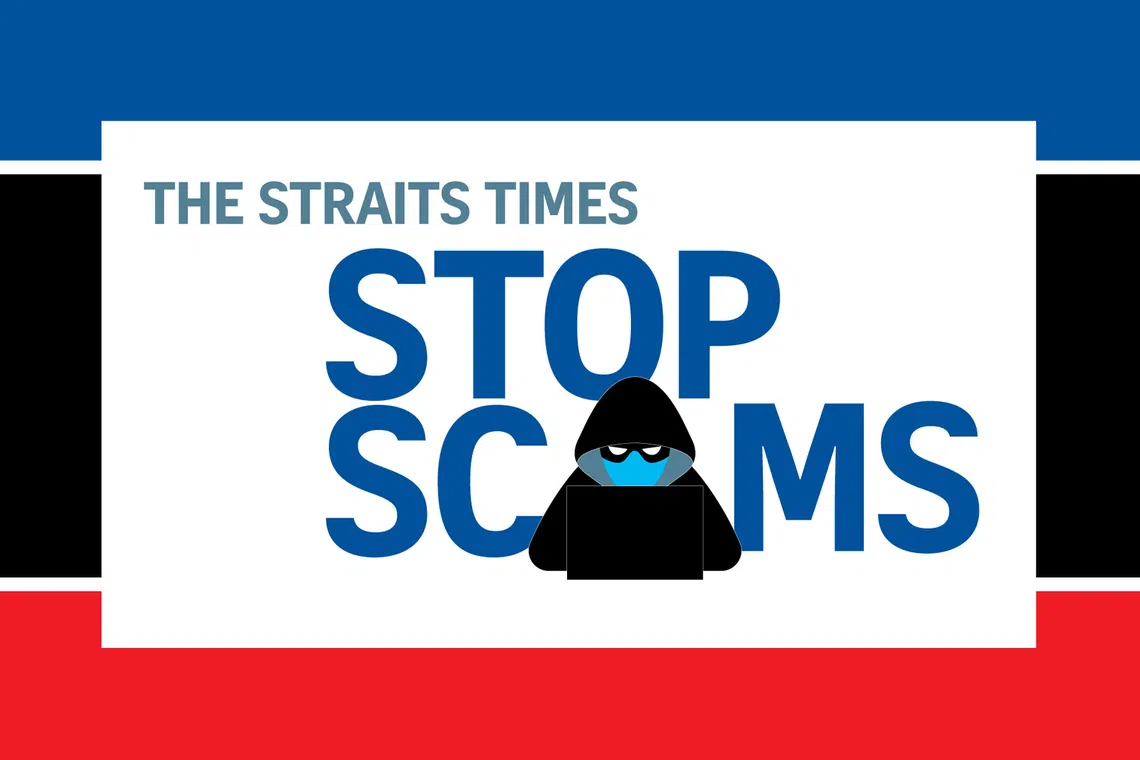Scam tracker: What are the trends in Singapore and how much money was lost in 2025?
Singapore has lost more than $3.4 billion to scams since 2019, with a record annual high of $1.1 billion in 2024 alone. The Straits Times looks at the scam trends in 2025.
Sign up now: Get ST's newsletters delivered to your inbox
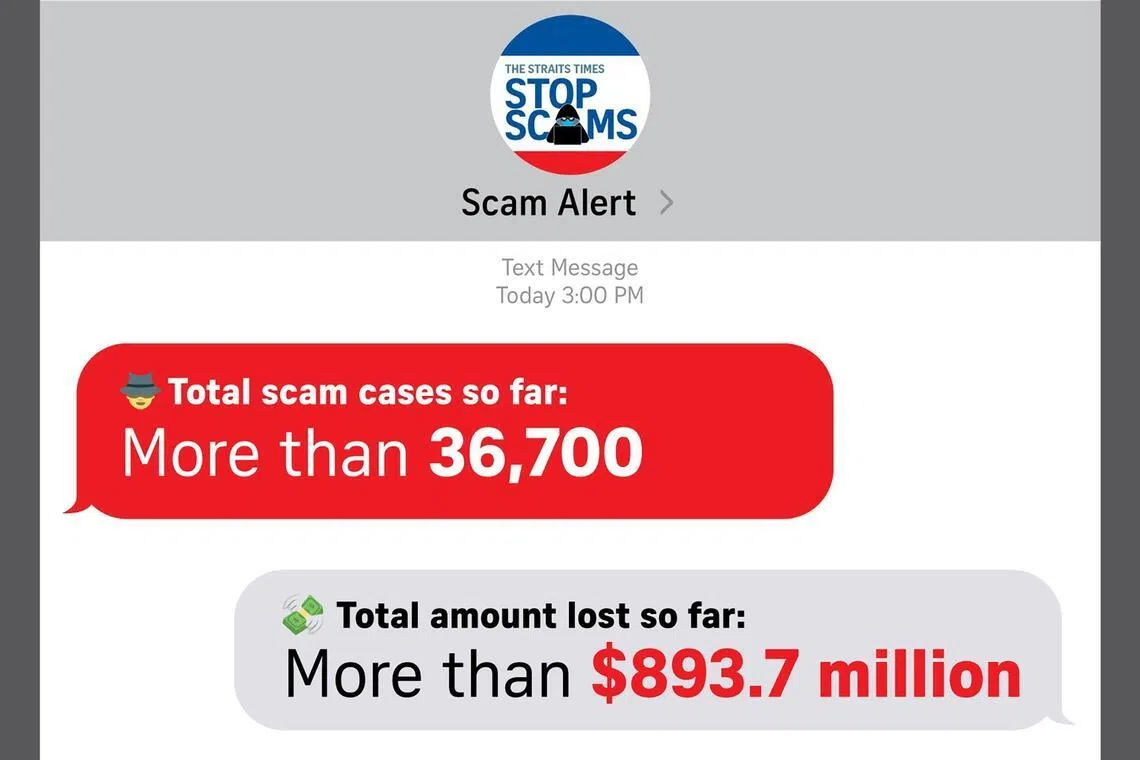
There were more than 36,700 cases of scams reported in 2025, with victims losing over $893.7 million.
ST GRAPHIC: BILLY KER
SINGAPORE – Scams have become a significant problem in Singapore, with both the number of cases and amounts lost repeatedly hitting new highs each year since 2019.
But 2025 looks to be the first year scam numbers will see a dip.
More than 36,700 cases of scams were reported, with victims losing over $893.7 million, according to figures released monthly by the police in 2025.
Finalised figures for the full year are expected in February.
In 2024, there were 51,501 reported cases of scams involving more than $1.1 billion –
Of this sum, the police have recovered about $182 million.
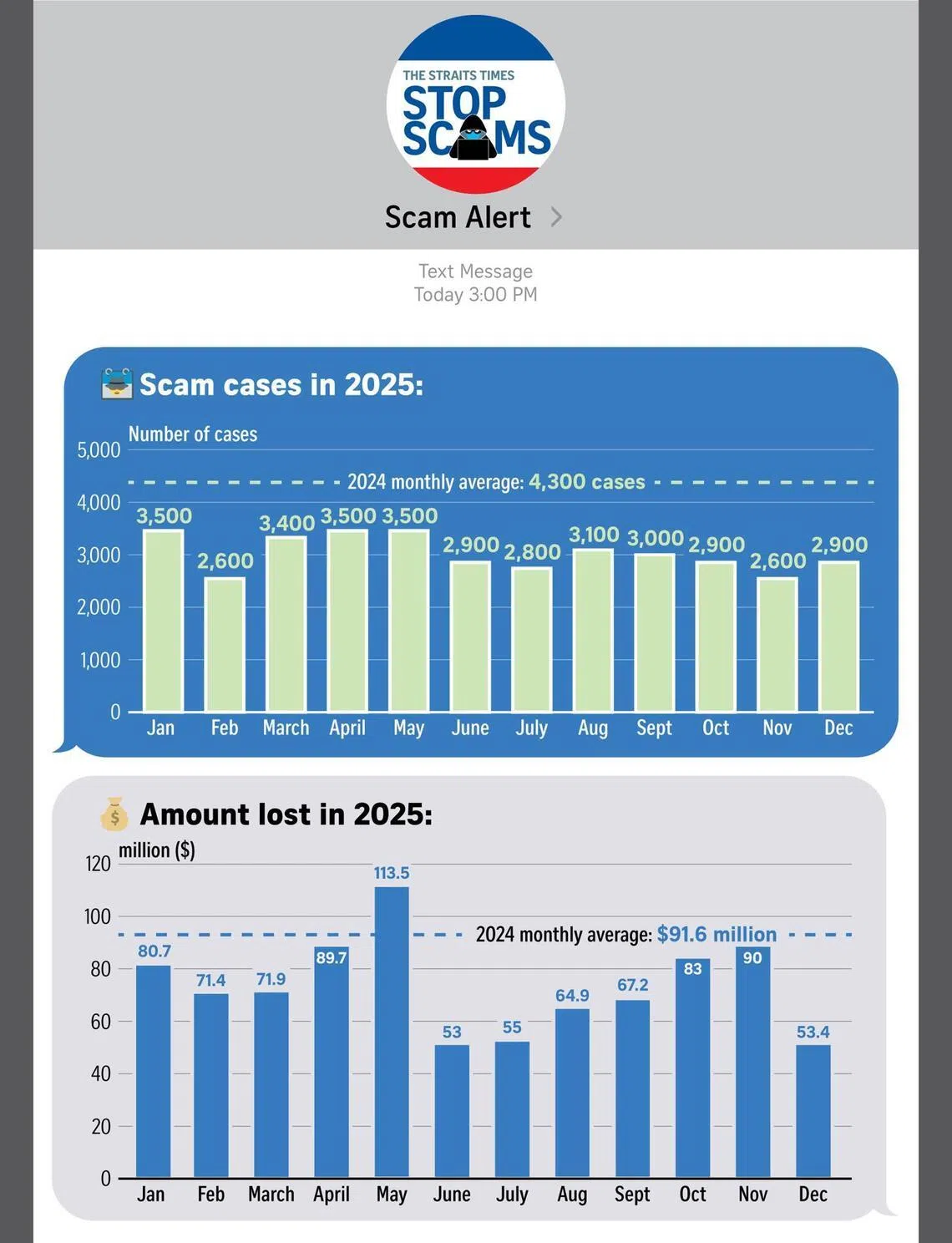
ST GRAPHIC: BILLY KER
December
There were more than 2,900 cases of scams reported in December, with victims losing over $53.4 million. Over 190 of these were impersonation scams, in which victims lost some $15.3 million after receiving calls about fake insurance policies.
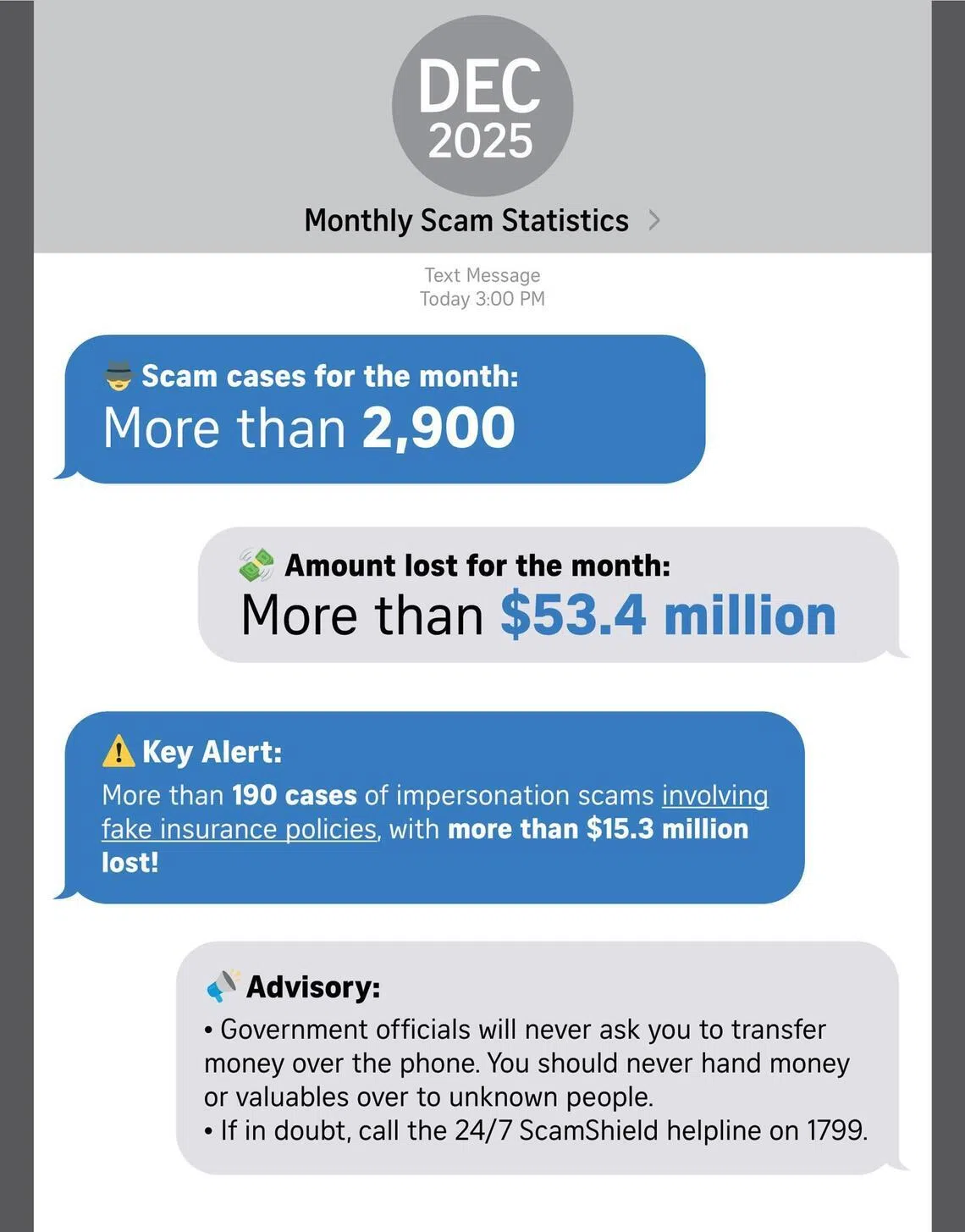
ST GRAPHIC: BILLY KER
Victims reported receiving calls from scammers pretending to represent insurance or payment institutions like NTUC and Unionpay.
The scammers told victims they had an insurance policy with them.
When the victims denied this, the call would be transferred to a second scammer who pretended to be an official from the police or the Monetary Authority of Singapore.
The scammers would accuse the victims of being involved in criminal activity such as money laundering or misuse of identity, and warn them to cooperate with investigations by either transferring money to a “safety account” or physically passing cash to an “undercover agent”.
Real government officials will never ask for money to be transferred over the phone.
Members of the public should be wary of receiving unsolicited calls, and should never hand money or valuables to unknown persons whose identities are not verified.
November
There were more than 2,600 cases of scams reported in November, with victims losing over $90 million. Over 400 of these were phishing scams, in which victims fell for fake social media ads and lost more than $3.4 million in total.
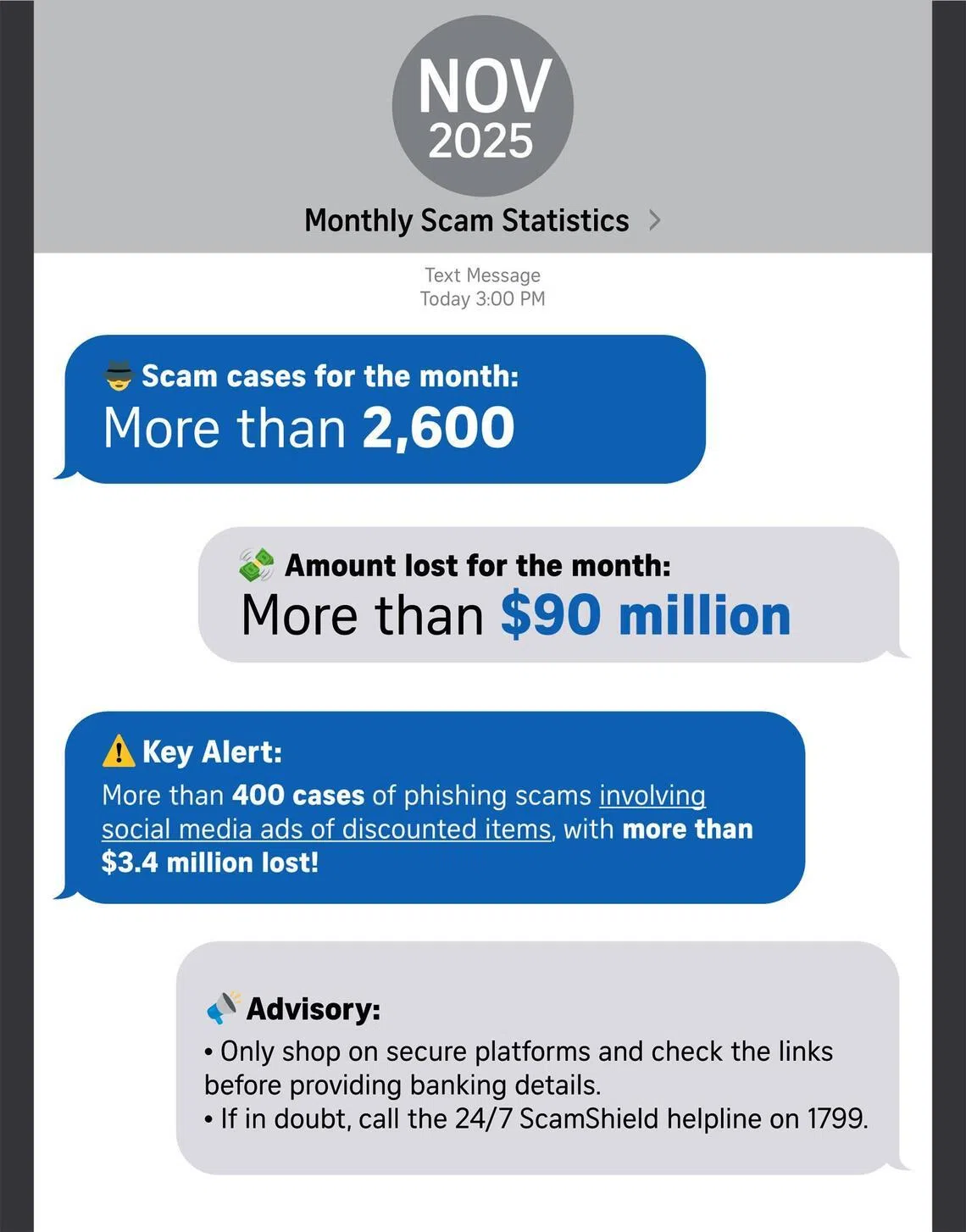
ST GRAPHIC: BILLY KER
Victims were enticed by discounted items being advertised on social media.
When they clicked on these fake ads, they were taken to external webpages which tricked them into keying in their banking and card details for the supposed purchase.
They only realised they were scammed after finding unauthorised transactions on their cards and accounts.
Members of the public should be wary of red flags such as discounts offered for faster transactions.
They should also check the links of websites carefully and verify they are legitimate before providing any banking or card information details.
October
Over 2,900 scam cases were reported in October, with victims losing more than $83 million. This includes over 540 e-commerce scam cases involving live-streaming on Shopee and Facebook, resulting in victims losing more than $2.7 million.
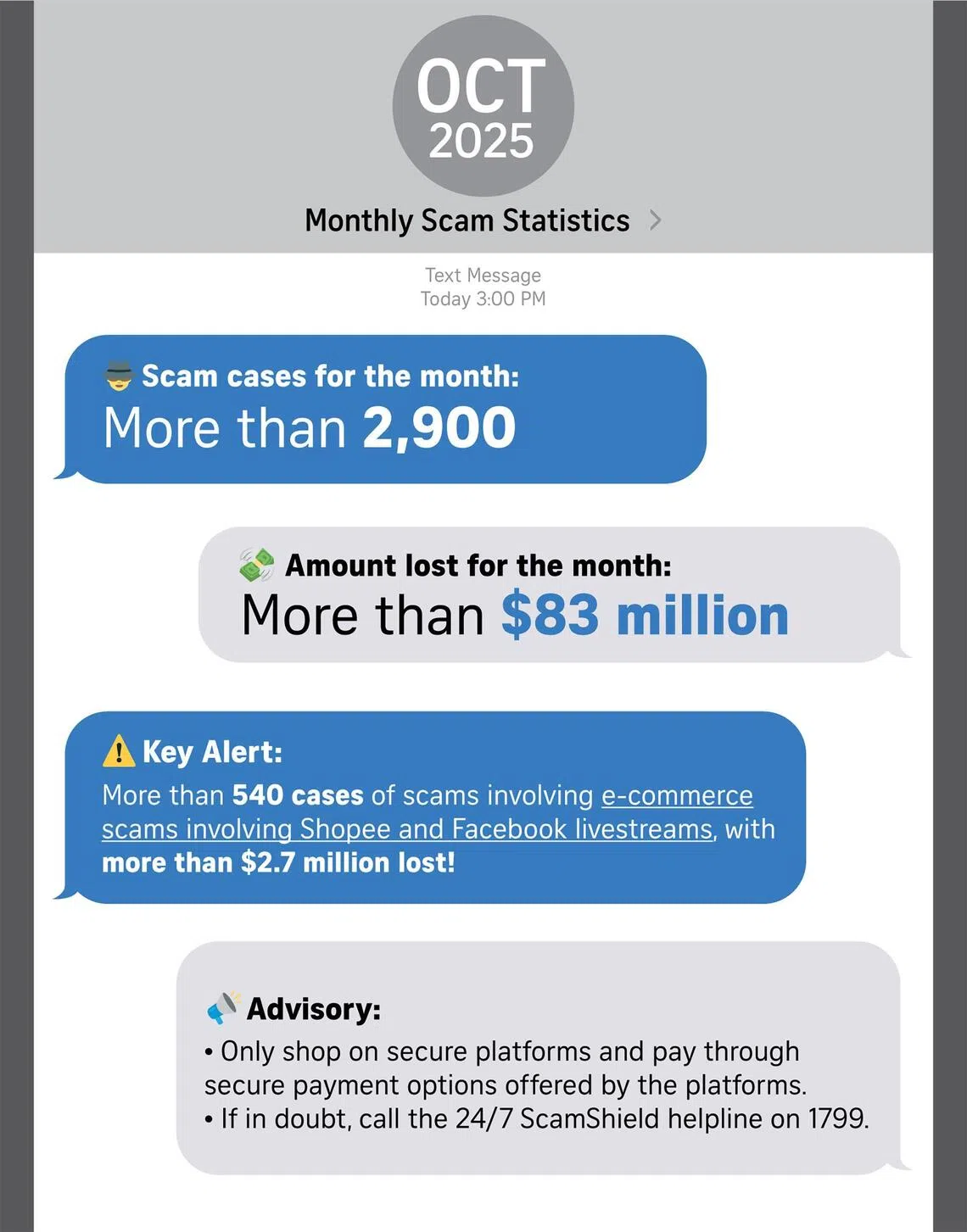
ST GRAPHIC: BILLY KER
Victims came across live-streaming on Shopee and Facebook, where jade and gold were supposedly being sold in a gamified manner.
The scammers sold bags that allegedly contained gold or raw jade stones, and victims could supposedly buy them for a chance to win.
Instead of paying through the platform’s secure payment options, victims were typically told to use PayNow or DuitNow with QR codes provided by the scammers.
If they did not win, they were told they could buy upgraded bags with a higher chance of containing gold or jade.
And if they did “win” a bag supposedly containing the minerals, the scammers would offer to repurchase it from the victims for more than its retail value.
But the victims would have to transfer even more money to get their supposed profits.
Victims realised they had fallen for a scam only after failing to receive their winnings or profits, or upon receiving fake items instead.
Members of the public should remain vigilant during the holiday sales season and shop only on secure platforms, using secure payment options.
Such options offered by the platforms themselves have safety features that withhold payments to sellers until buyers confirm receipt of the products.
September
More than 3,000 scam cases were reported in September, with victims losing over $67.2 million. This included more than 40 cases of impersonation scams involving Alipay, in which victims lost over $370,000 in total.
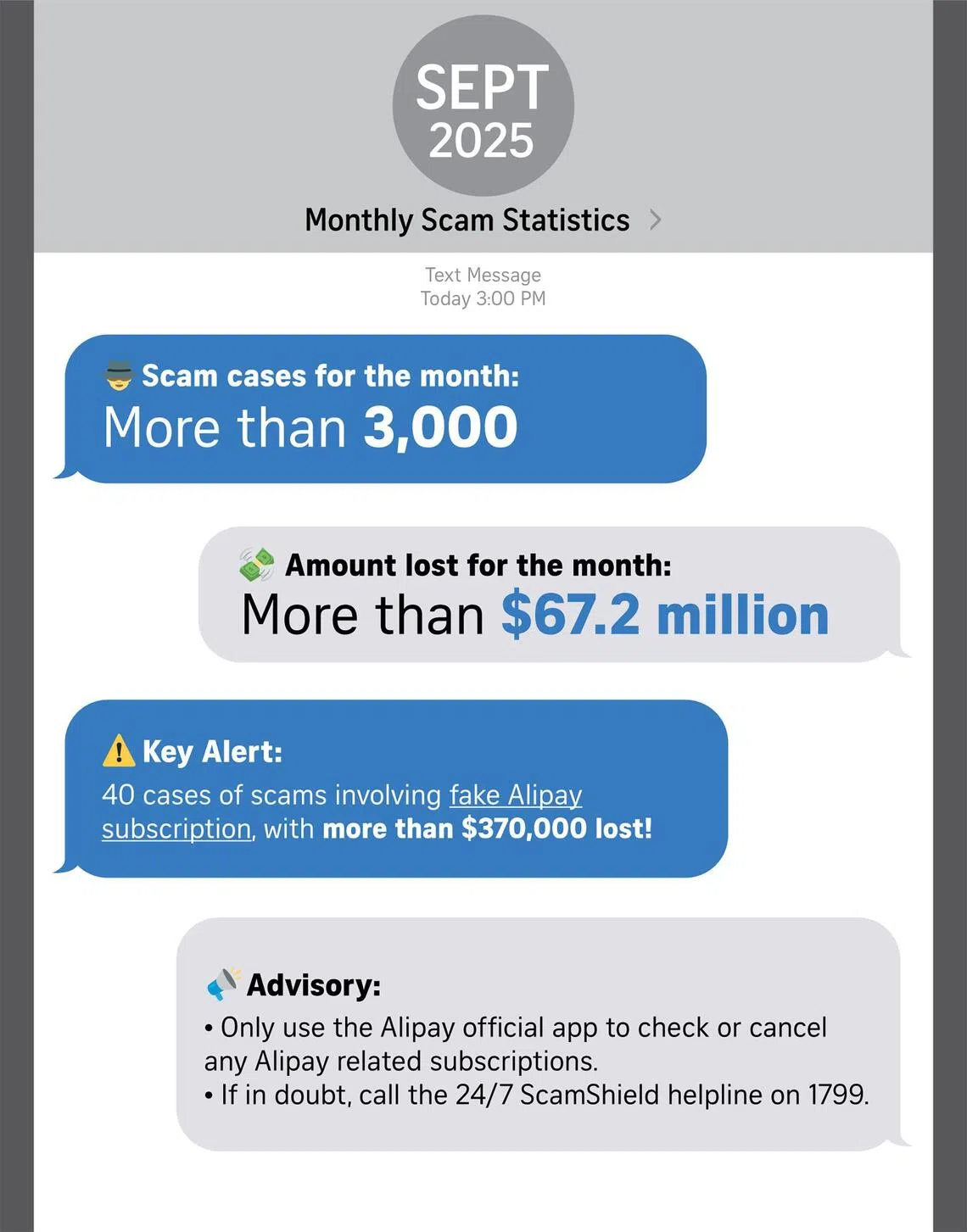
ST GRAPHIC: BILLY KER
Scammers pretending to be from Alipay contacted victims, claiming they had an existing Alipay subscription.
The victims were told that to cancel the subscription and avoid recurring payments, they would have to share their screens via WhatsApp as part of the cancellation process.
While doing this, the scammers tricked the victims by instructing them to input their banking details and manipulated them into authorising money transfers instead.
Members of the public should not share their screens with unknown persons.
Use only the official Alipay app to check on or cancel any Alipay related subscriptions.
If in doubt, verify the identity of the caller by hanging up and contacting the organisation directly.
August
More than 3,100 cases of scams were reported in August, with victims losing more than $64.9 million. These included 590 reports of job scams, with victims losing more than $11 million.
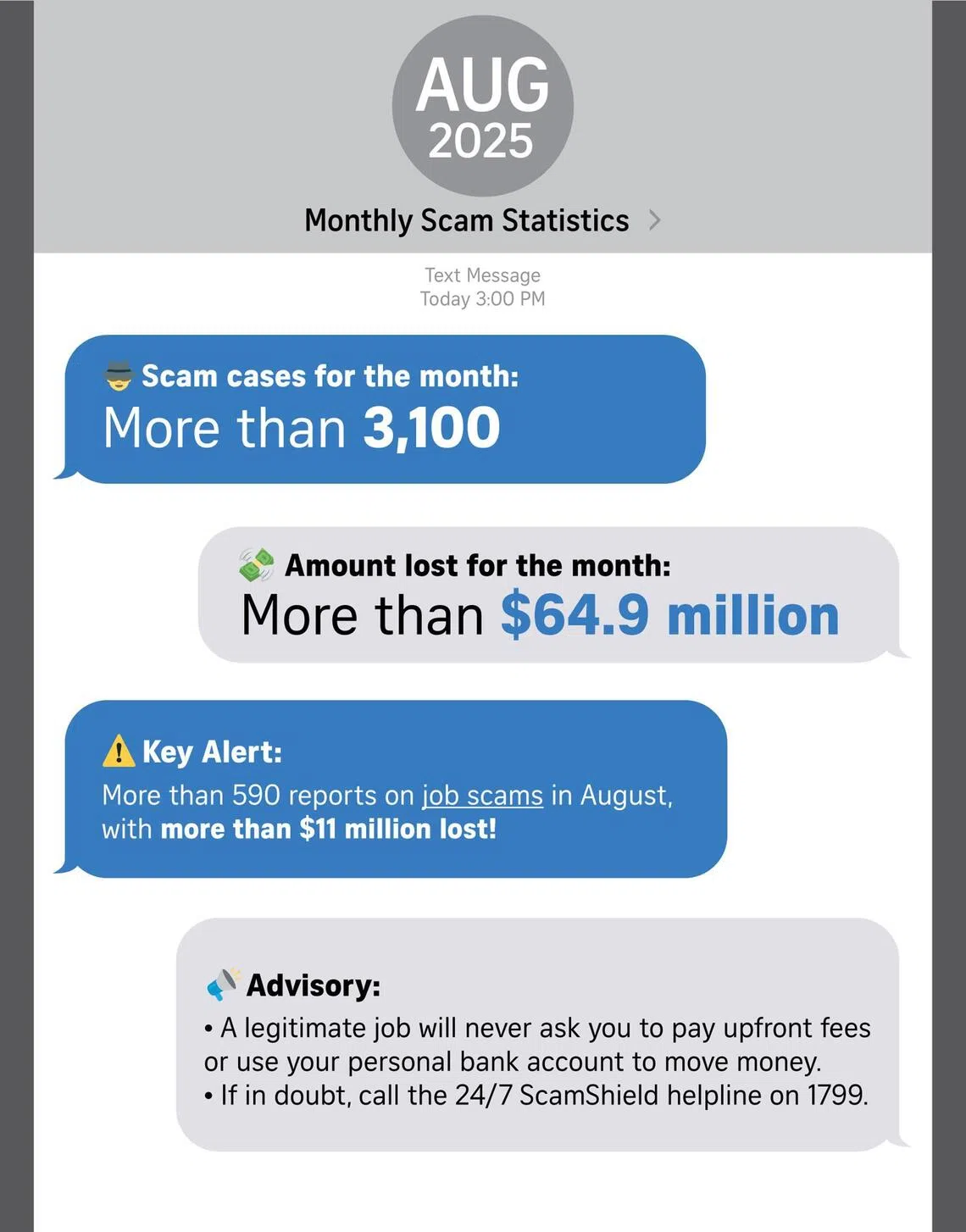
ST GRAPHIC: BILLY KER
Victims received supposed job offers through messaging apps, with the scammers claiming these were easy part-time jobs that could be done remotely.
The purported jobs involved completing simple tasks for high fees.
The scammers would start with small tasks, like liking a certain number of posts on social media they claim were for a marketing campaign.
Victims would complete the tasks and initially receive a small payout to make them think this was a real job.
Once hooked, they were asked to put in their own money as a deposit to unlock other tasks, like filling up surveys, which promised even higher fees.
In some cases, the victims were also asked to provide details of their personal bank accounts to be used to receive and transfer money.
Some were also asked to hand over cash to unknown individuals.
Victims would only realise they were being scammed once they could not get their money back or they were informed by the police that they had fallen for a scam.
July
Over 2,800 scam cases were reported in July, with victims losing more than $55 million. Among these, more than 550 were cases of investment scams, in which victims lost over $23 million in total.
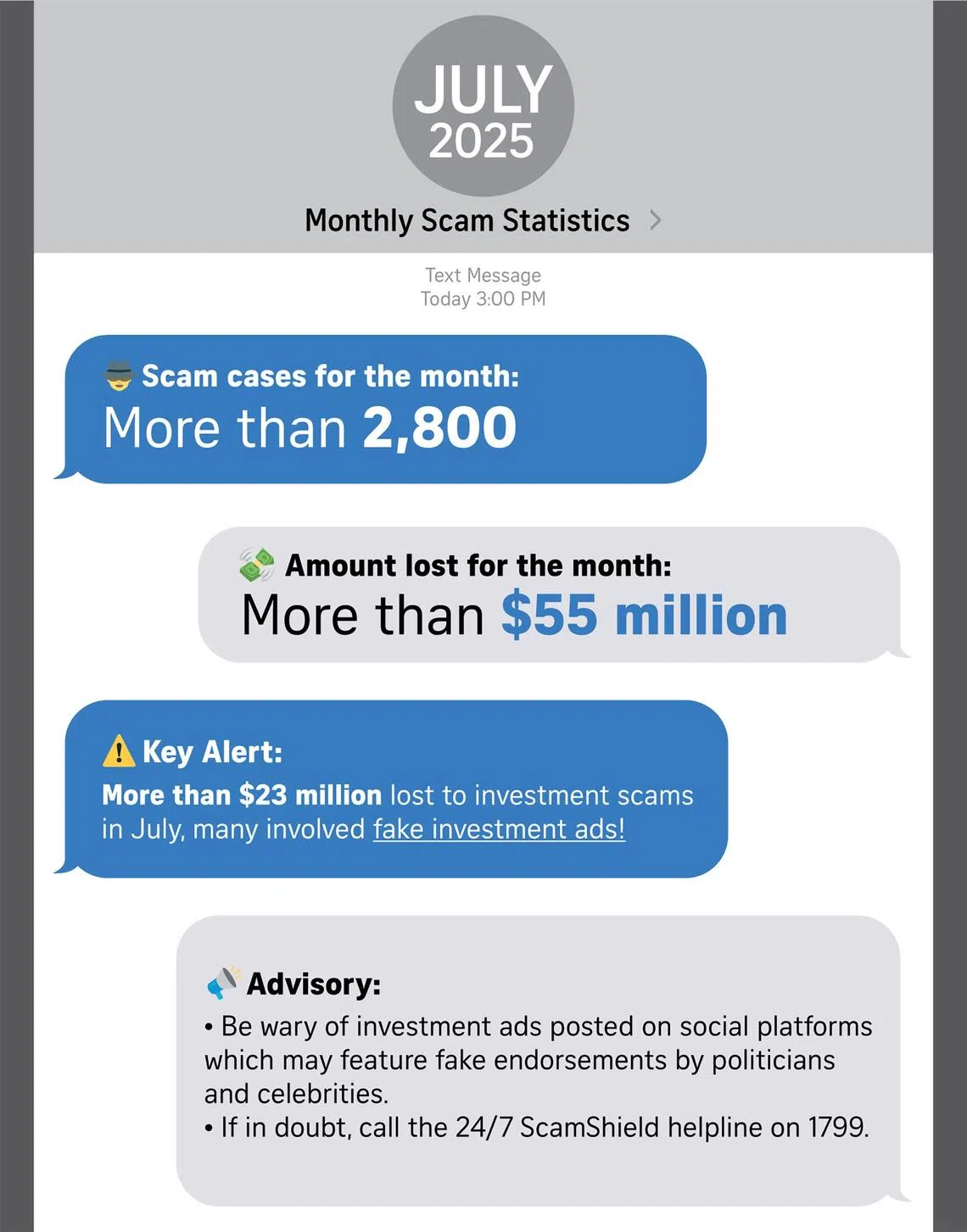
ST GRAPHIC: BILLY KER
Victims of the investment scams were typically lured by fake advertisements and posts on social media platforms.
These ads and posts often featured fake endorsements by politicians and celebrities.
In some cases, victims were told to download fake mobile applications and create accounts to take part in supposedly lucrative investment opportunities.
They would then be instructed to transfer money to specified bank accounts or cryptocurrency wallets.
The funds were purportedly part of an investment to buy goods from wholesalers to start an online business.
In some instances, the scammers initially provided victims with small profits to trick them into depositing more money into the scheme.
Victims only realised they had been scammed when they could not withdraw their money, or when the scammers became uncontactable.
Members of public should never transfer money to unknown bank accounts or cryptocurrency wallets, and should check the Monetary Authority of Singapore’s website
Political office-holders will never endorse investment products.
June
There were more than 2,900 scam cases reported in June, with victims losing more than $53 million. More than $1 million of the amount was lost to e-commerce scams.
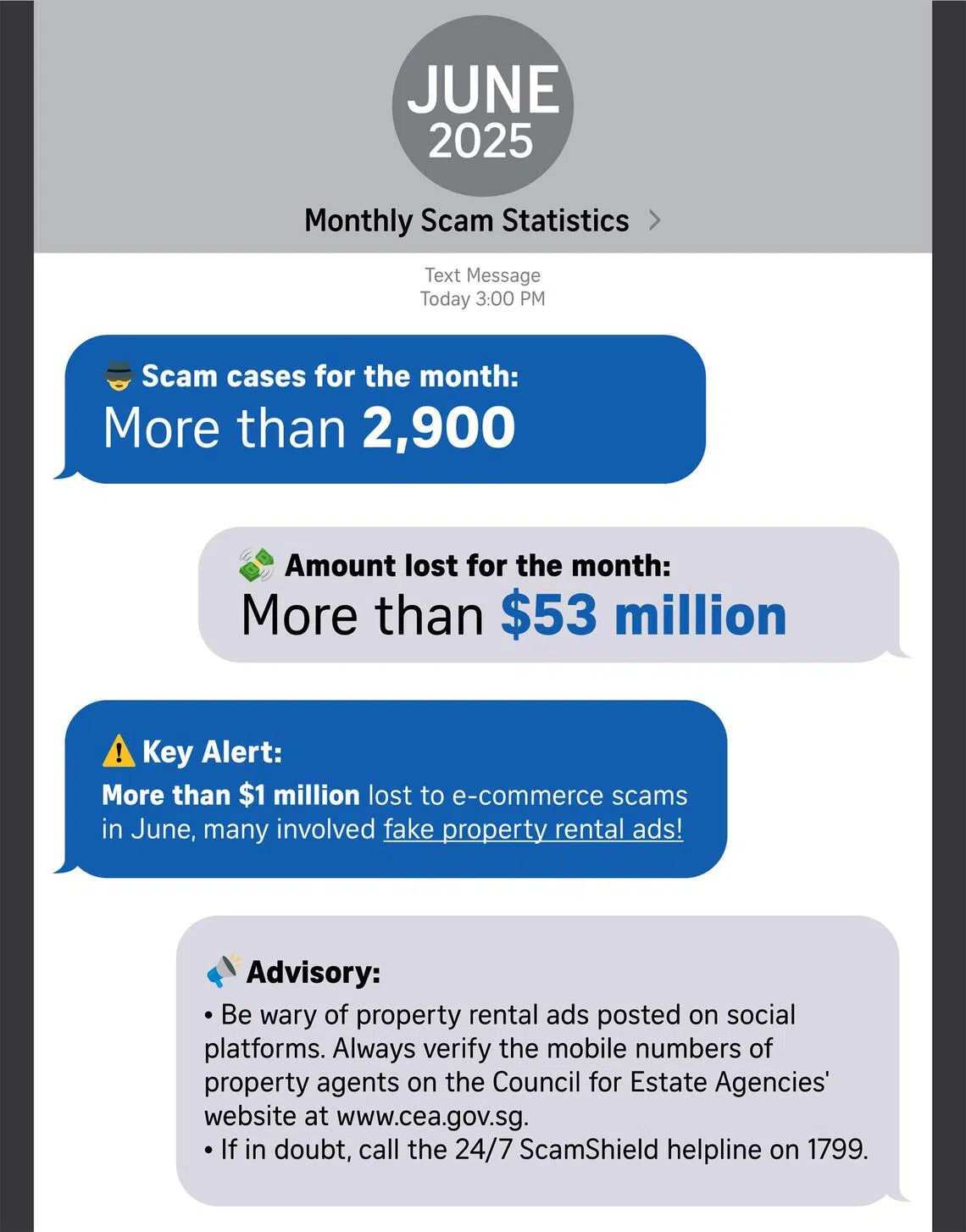
ST GRAPHIC: BILLY KER
Victims were lured by fake property rental ads posted on platforms like Facebook, Telegram and Carousell.
They would place a deposit via bank transfer and then find that the supposed agent was no longer contactable.
In some of these cases, victims would attempt to do their due diligence by physically meeting up with the purported agent and viewing the rental property.
But these people claiming to be agents were actually scam mules.
Members of the public should always verify the identity of property agents and contact them only through their registered mobile numbers that can be found on the Council for Estate Agencies website
They should not make any advance payment until the tenancy is confirmed.
May
More than 3,500 scam cases were reported in May. At least 190 of them involved the impersonation of government officials, causing victims to lose more than $16.9 million in total.
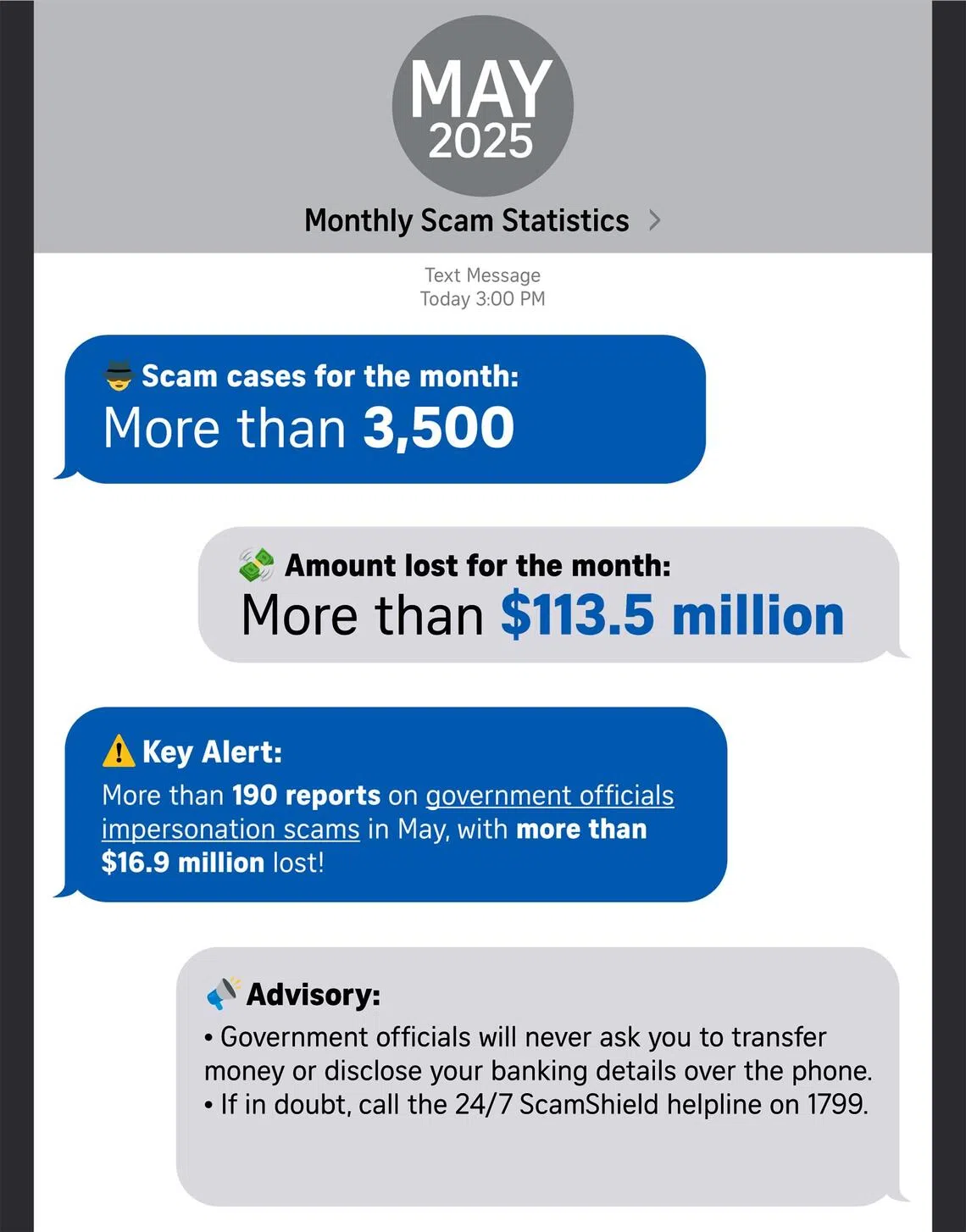
ST GRAPHIC: BILLY KER
Scammers impersonating government officials make phone calls to victims, accusing them of being involved in criminal activities like money laundering.
In some instances, these fake officials would claim to be helping victims by transferring the call to someone pretending to be from the police.
Victims are then told they should transfer their money to supposed “safety accounts” for investigation.
Similar scam variants were prevalent in January.
Real government officials will never ask for money transfers or banking details over the phone.
They will also not be able to transfer calls to the police.
April
There were more than 3,500 scam cases reported in April. A phishing scam variant involving offers of unlimited travel on public transport was the subject of over 100 reports, with its victims losing $106,000.
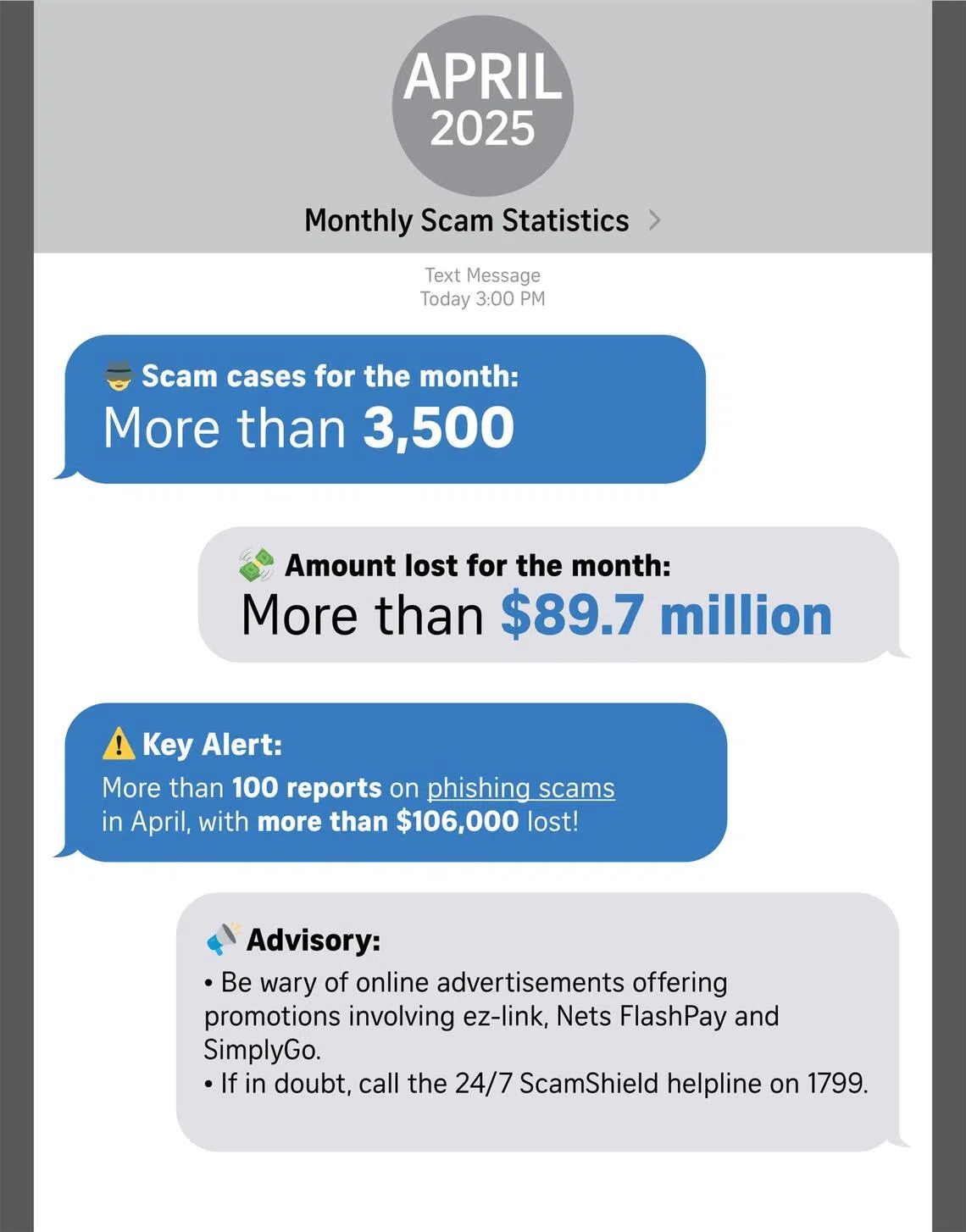
ST GRAPHIC: BILLY KER
Victims were enticed by fake advertisements on Facebook, Instagram and TikTok promising unlimited travel using ez-link or Nets FlashPay cards.
The advertisements contained links leading to phishing sites that prompted victims to key in their credit or debit card details, banking credentials and one-time passwords.
Victims only realised that they had been scammed when they discovered unauthorised transactions from their bank accounts or cards.
In some cases, transactions were made through Grab or GrabPay Wallets, and some were also made in foreign currencies.
March
More than 3,400 cases of scams were reported in March. Of these, more than 525 were reports of investment scams in which victims lost a total of more than $24.5 million.
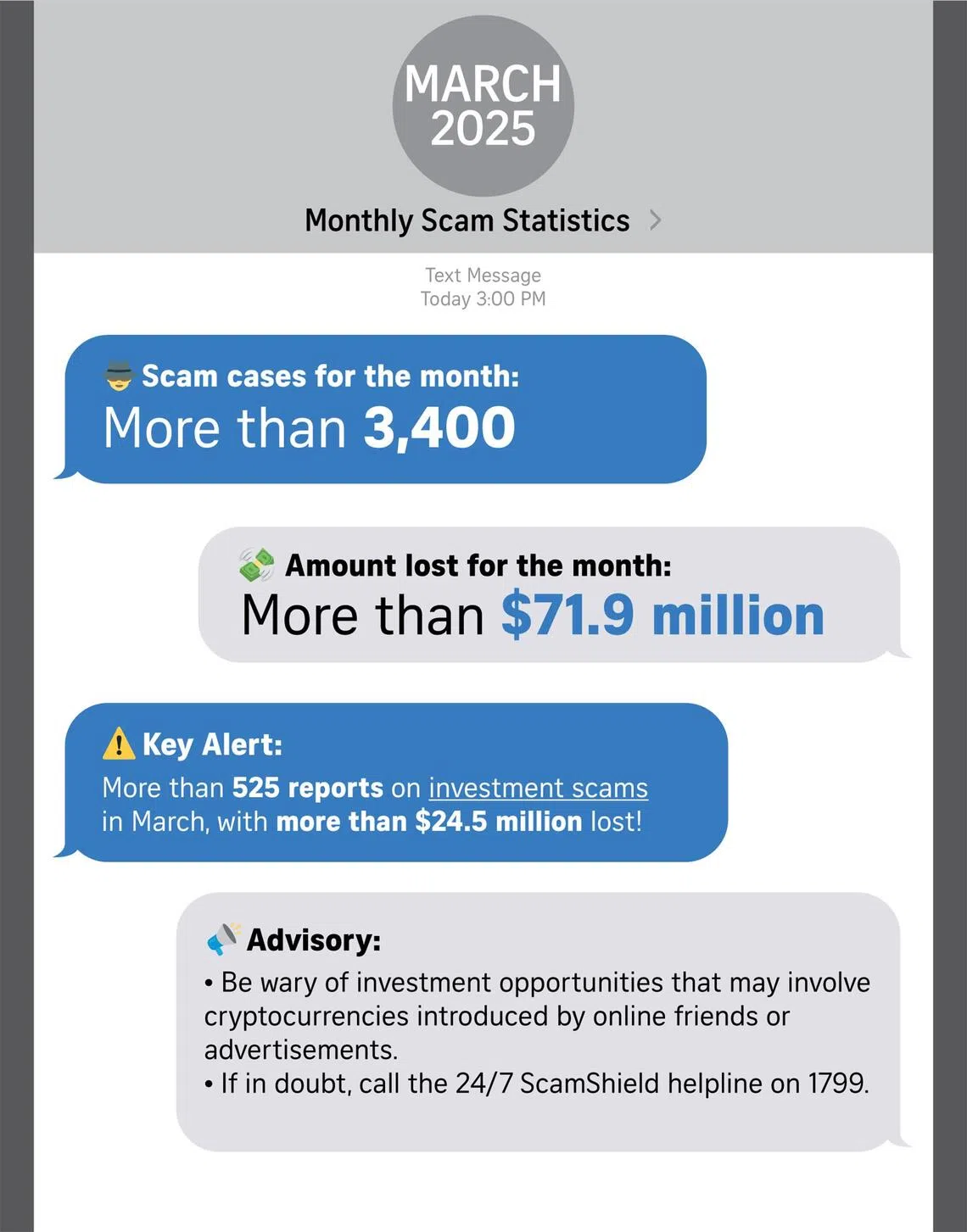
ST GRAPHIC: BILLY KER
The victims had typically come across fake investment opportunities through online advertisements or were recommended by friends they met online.
These scams may involve cryptocurrencies or were seemingly endorsed by political figures or celebrities.
Once enticed, the victims transferred funds to specified bank accounts or cryptocurrency wallets.
In some cases, they received initial returns of small profits, leading them to believe the investments were real and to sink in more money.
They would realise they were scammed only after experiencing difficulties in withdrawing their supposed earnings.
February
There were more than 2,600 cases of scams in February, of which more than 265 reports were for Chinese services impersonation scams involving more than $5.6 million in total.
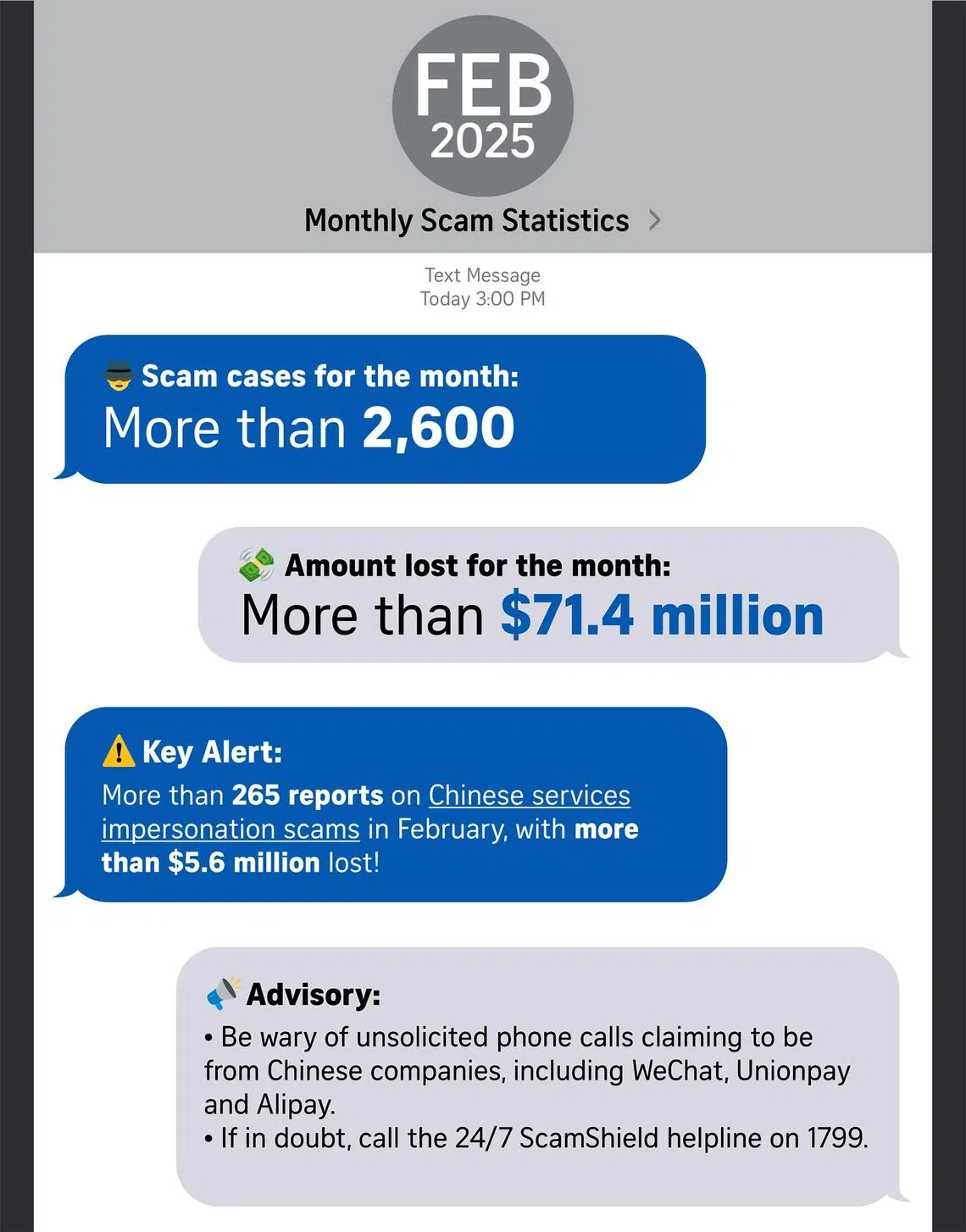
ST GRAPHIC: BILLY KER
This variant of impersonation scams involves victims receiving unsolicited phone calls from scammers claiming to be staff from Chinese services such as Tencent, WeChat or UnionPay.
Scammers would typically inform victims of an expiring subscription, and claim fees will be deducted from their bank accounts unless they cancelled the subscription immediately.
To cancel the subscription, victims would have to verify their identities by providing personal information and making monetary transfers.
They are also told their money will be refunded upon successful verification.
Most victims would realise they had been scammed only after making multiple monetary transfers without receiving the promised refunds.
January
Out of more than 3,500 cases of scams in January, over 135 reports involved the impersonation of government officials and saw victims lose more than $1.6 million in total.
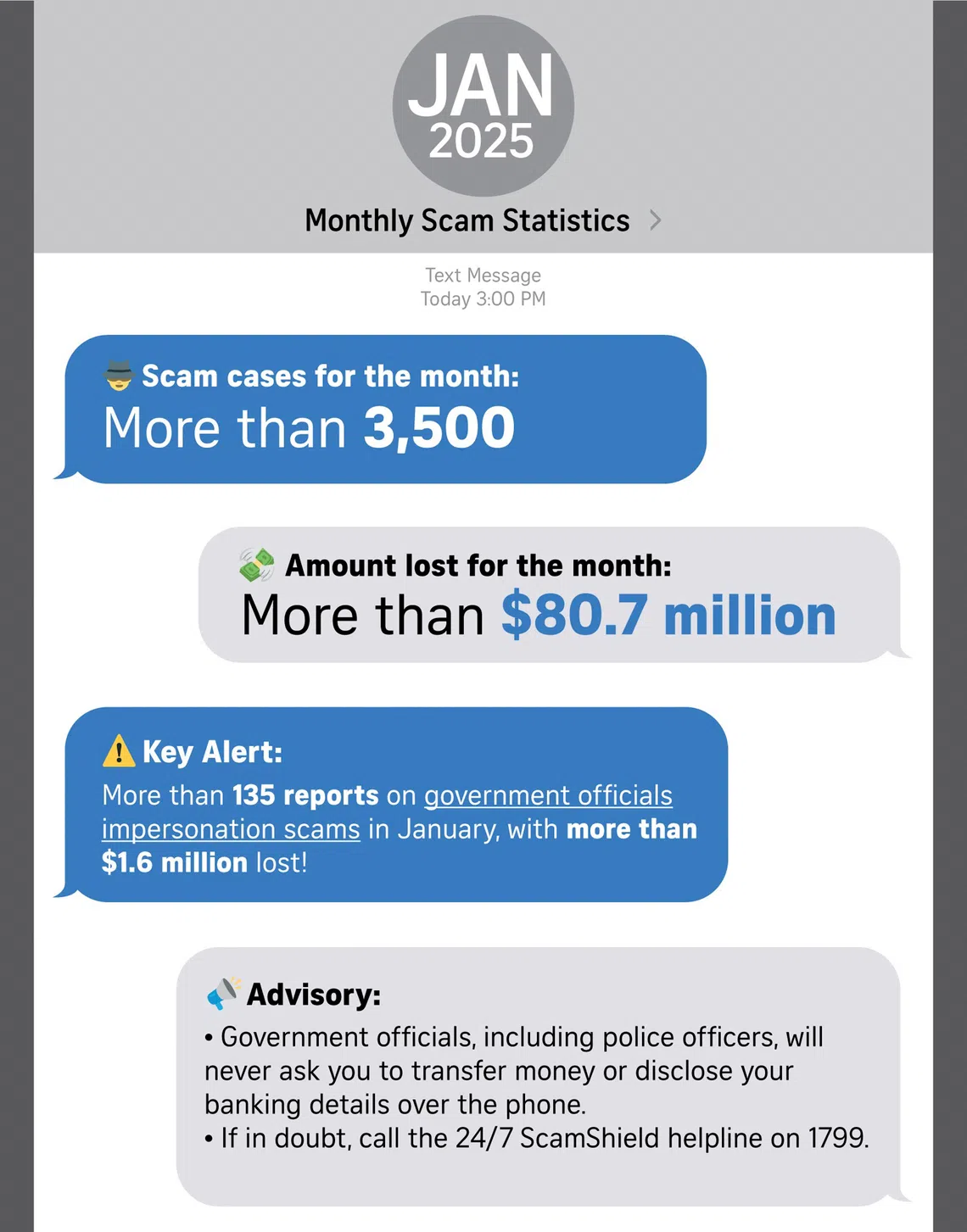
ST GRAPHIC: BILLY KER
In these scams, victims receive unsolicited calls from people claiming to be from government agencies such as the Singapore Police Force or the Immigration and Checkpoints Authority.
These scammers would then claim the victims were involved in some sort of trouble and have to provide their personal and banking details or risk facing legal action.
They may also be asked to transfer their money to other bank accounts for supposed safe keeping or checking, or to download certain applications on their mobile devices.
In some instances, the scammers would also video-call the victims while wearing uniforms.
Many of such video calls involve the use of artificial intelligence to mask the caller’s real appearance and voice.
But real government officials will never ask for money transfers or for banking and personal details over the phone.
Add, check, tell
The national anti-scam campaign, I can ACT against scams, was launched in January 2023.
The ACT acronym in the campaign slogan outlines how members of the public can Add security features, Check for signs, and Tell the authorities and others about scams.
Members of the public are advised to add security features like the ScamShield app to help identify potential scam messages and calls, and to install antivirus apps to protect their devices against malware.
They should also check for scam signs by verifying a caller’s or sender’s identity directly with the organisation they claim to be from.
If one has fallen for a scam, they should immediately tell the authorities by making a police report and informing the relevant financial institutions.
If in doubt, call the 24/7 ScamShield helpline on 1799.
